Before I jump into the deep morass of sedate crooning that is Andy Williams, let me attempt to educate you a little on European copyright law. In the United States, copyright law on music released between 1923 & 1978 restricts publication of said copyright to the owner for 95 years. In the United Kingdom, this is not the case. Essentially, music falls into copyright 50 years after publication, meaning that currently anything from 1963 and previous is public domain. As a result, many record labels have sprung up to leap at this opportunity to release many golden gems from 60's and previous that are heretofore unattainable except by the original copyright holder in the US. They then import these releases into the US very cheaply.
Now here's the rub. Often the quality of these releases is shoddy, containing poorly compressed non-master tracks (sometimes including hiss of a needle as they were ripped from the LP) with limited to no liner notes. Now a few of these companies like JSP Records actually do a bang-up job of re-mastering and including well-written liner notes while still offering a reasonably affordable package.
Then you have Real Gone as an extreme in the other direction. Real Gone releases primarily 4-disc sets of generally 6 to 8 full albums (depending on album length) by a particular artist. The liner notes are typically sparse to non-existent, but surprisingly the quality of the releases is typically pretty decent. More often than not they seem to be CD rips, although I have heard a few albums here and there that seems to have been lifted from the original LP. Occasionally you have compression problems, but it crops up randomly and infrequently enough to not be too much of a bother. The real clincher for me on these is that they can be found for as cheap as $8 a set which is a steal given the quality is relatively good. The other benefit is they have released so many of these sets in the last two years that they have released many sets by more obscure artists that would not have normally merited a 4-disc box set.
Which leads me FINALLY to my review of the Andy Williams: Eight Classic Albums set. First of all, in case you are wondering, this DOES NOT include Moon River. What it does collect is Andy Williams' first eight studio albums (Moon River came three albums later for those of you curious for some reason), all released on Cadence Records before he made the jump to Columbia. This includes his output from 1957 to 1961. Nowadays it boggles the mind to imagine artists releasing as many as four or five albums a year, but it was pretty commonplace back in the fifties and sixties. This was partially due to the amount of songs performed by artists that were written by others. They didn't need a several month gap between recordings to compile new material. Often they would just pull up the book of established standards or recent pop hits of the time period and cover them. Both of these examples are in evidence a-plenty in this box set.
Leading off with Andy's first album is Andy Williams Sings Steve Allen. For those keeping score, we are talking about Steve Allen, the comedian and host of The Late Show. In addition to his more profitable pursuits, he also recorded several jazz albums, primarily offering songwriting and piano accompaniment to more accomplished musicians. These were typically a combination of bebop and torch songs, which Andy Williams on this album performs to some degree of success. Having primarily known Williams for his post-Moon River easy listening career, it was something of a treat to hear him evoking a lighter and rawer tone on this release. For the most part the accompaniment is sparse, offering a combination of slower ballads and bouncy bebop numbers. This is Andy at his liveliest and one of the better albums in the set.
Following it up is Williams' self-titled album (actually a compilation of singles), originally given the odd title "He's All Male and Catnip to Quail," Says Archie. The title comes from Archie Bleyer, the head of Cadence Records, and his insistence at the time of titling albums with some sort of descriptive commentary based on most likely his own personal opinion of the album (other examples include The Everly Brothers' "They're Off and Rolling," says Archie and The Chordettes' "They're Riding High," says Archie. I don't know what Andy did to deserve this title, but it definitely takes the cake in weirdness. The album itself is a bit of an outsider in his catalog as well, offering more country- and rock-based instrumentation often in lieu of his typical piano and string accompaniment. The album feels a little schizophrenic at times because of this and may not be terribly pleasing to more traditional Williams fans, but I felt it was one of the more interesting albums in the set and was able to hold my attention from beginning to end.
Up next is Andy Williams Sings Rodgers and Hammerstein, and this is the point at which Williams begins to lose me. With tracks from Oklahoma!, South Pacific, Carousel and The King & I (all musicals I did not care for), Andy was going whole hog with a cash grab. At the time of this album's release, tracks from all these musicals from multiple different artists were dominating the Billboard charts, and I suppose Andy wanted a piece of that action. The majority of this album settles into William's usual groove of churning out predictable, straight laced versions of well-established hits and is all for the worse because of it.
Speaking of cash grabs, the next album on the chopping block is Two-Time Winners. In a similar vein to his ode to Rodgers and Hammerstein, Two-Time Winners features all songs that were previously hits for someone else twice or performed in two different ways (i.e. "Blue Hawaii" being a hit for Bing Crosby and also having an instrumental version performed by Billy Vaughn & Orchestra). Once again, I must express disdain for these lukewarm versions of well-known classics. I wish to point out particular disappointment with Williams' rendition of "Blueberry Hill". I have a great fondness and sense of nostalgia for the excellent Fats Domino version and am borderline offended by the stilted performance Williams phones in on this one. This album worked out for Williams in the end though as he had a great amount of success with "Hawaiian Wedding Song", so much so that the next album he recorded was comprised entirely of Hawaiian songs, giving an excuse to feature "Hawaiian Wedding Song" again...
...Which flows nicely into our next album, To You Sweetheart, Aloha. Honestly, if you changed the instrumentation slightly (replace ukulele with violin, etc.), this could be just another easy listening Andy Williams album. For an album comprised entirely of Hawaiian songs, it seems totally devoid of cultural significance. Given that this album probably only exists because Williams had a hit with "Hawaiian Wedding Song" does nothing to boost its credentials (It probably also didn't hurt that America was in the embrace of Hawaii-mania with the admission of the 50th state into the union the year of this release).
Lonely Street is the sixth album in this collection and a little bit of a departure from the previous string of albums in that thematically this is a much darker affair than Williams is typically used to. His delivery seems a little deeper and more impassioned as well (at least as impassioned as Williams gets). The album was conceived as a way to ape Sinatra's recent success with In The Wee Small Hours and Sings for Only the Lonely, which were all about doom 'n' gloom. I have to call out that I felt Williams' covers of "Unchained Melody" and "I'm So Lonesome I Could Cry" are far inferior to the more well-known Righteous Brothers and Hank Williams versions. While I won't say this album is a fully qualified success (it drags a little too much for that and includes the unfortunate renditions mentioned), it is still an improvement over the last three albums and a sign that all hope is not lost with this set.
Perhaps as a way of digging himself out of the dumps, Andy's next album is a collection of popular uplifting spirituals called The Village of St. Bernadette. In general, while this album isn't my cup of tea, I have to admit that the fuller sound granted by the backing orchestra and choir is appealingly exuberant and suits Williams' voice well. He even has a slight call back to his earlier jazzy releases with a toe-tapping version of "He's Got the Whole World in His Hands" that bounces where it should but not so much as to get the non-secular target audience in a tizzy.
Ending on a positive note, the final album in this collection, Under Paris Skies, finds Andy flying out to Paris and recording with an orchestra conducted by the great Quincy Jones. The pedigree on this album is immediately noticeable with full, and most importantly authentic-sounding, instrumentation backing an album of Chanson (and Chanson-like) standards. According to comments by Williams himself, the band was a little more relaxed and unaccustomed to a tight schedule as he, but the end result was worth it. I have to agree with sentiment as I enjoyed this album more than any other since his debut of Steve Allen songs.
In the end, looking back on the 5+ hours of Andy Williams I just subjected myself to, i ask myself, "Was it worth it?" I think overall, yes. While Williams is not without his fair share of out-for-a-buck toss-offs and barely-there easy listening pap, this collection offered a wider breath of music than I was previously aware from Mr. Williams. And while I don't see myself returning to this particular well over and over again, the collection is not without merit and some of these songs could end up making their way into my regular rotation. Plus, at $8 for this whole set, the price is right.

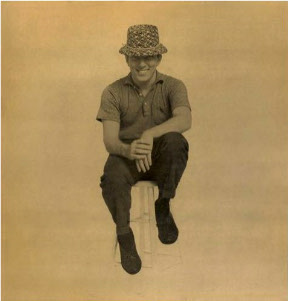
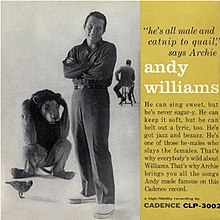
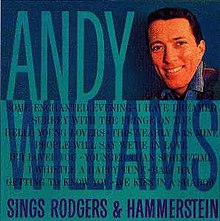
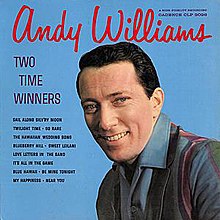
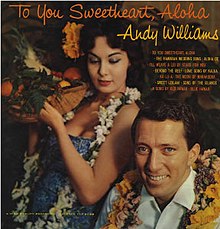



No comments:
Post a Comment